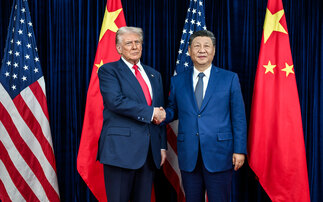As the global economy slowly limps back to life, what has been clearly noticeable is that Asia has proven resilient not only from an economic growth perspective, but its markets have also held up during this period. Paras Anand, Chief Investment Officer, Asia Pacific believes this is a pivotal moment for Asia as it moves from resilience to recovery and signals the growing role it will play going forward - both in the global economy and within investors' portfolios.
As a region, Asia has managed the pandemic well both on a relative and absolute basis, creating a shorter path to economic recovery. Key economic indicators for the region continue to be positive, particularly in China, where economic activity has returned to pre-Covid-19 levels. But there are other factors that are aiding the recovery of the region.
Headwinds turn into tailwinds
The sharp decline that we saw in oil prices earlier this year has provided a boost for the region. Typically, oil prices have been a headwind for the region as it is largely a net importer, but the significant reset in oil prices - still some 30% below from last year- will provide a tailwind for the Asian economy.
Another crucial factor is the US dollar, which has been revaluing substantively since the financial crisis in 2008. Even 12 months ago, the US dollar was the one of the most expensive of currencies globally. But the significant US monetary and fiscal stimulus, are beginning to put additional downward pressure and we have seen the US dollar start to underperform significantly recently.
In terms of opportunities in Asia, we see factors such as the fall in the oil prices and the weaker US dollar, both historic headwinds becoming tailwinds for the region, adding to the confidence in the near term.
Rising interdependence within Asia
The long shadow cast by the pandemic has changed the way that businesses and industries operate. The global economy has shifted from globalised supply chains and this has resulted in growing interdependence within Asia. We expect this trend to accelerate in the coming years, while at the same time, the dependence on Western demand will decline.
Within the region too, trade is becoming a declining part of the overall economy. So, if we look at Southeast Asia and China, other parts of the economy - whether it's services or consumption - are growing relative to trade as part of the economic mix.
Even in the context of trade, we are seeing a greater proportion of that trade intra-Asia. As a result, there's much more interdependence within Asia as an economy, relative to 10 or 15 years ago where there was a much higher dependence on the rest of the global economy and demand in the global economy outside of Asia shaped the economic prospects of Asia as a region.
Today, some 60% of all trade in Asia occurs within countries from the region. As we move into what we would argue is a new shape to the global economy in terms of increased regionalisation and reduced globalisation, this increased interdependence will be one of the key themes that will continue to support the Asian growth story going forward.
The fourth industrial revolution
When we think about some of the things that have emerged globally as a result of the pandemic, the ever-growing reliance on technology and digitisation would be one of the most significant outcomes. With a well-established digital infrastructure, Asia is currently at the forefront of the next generation of technologies, supporting the case for Asia to play a leading role from a technological perspective as well.
We see the region as being a key beneficiary of the rollout of 5G technology and providing a good base for leadership in artificial intelligence. We expect new technologies such as autonomous driving becoming more widely adopted in the region due to a combination of technological capability, access to data as well as physical infrastructure.
Supportive valuations
So how does this optimistic view of Asia, both from an economic and technological point of view, shape up in terms of valuations from equity and fixed income?
From a risk-reward perspective, we see Asia offering compelling value relative to the rest of the world. For instance, Asia investment grade and high yield provide very attractive coupons. Additionally, in terms of leveraging, the corporate sector in Asia is very sound.
Overall, we believe Asia should form part of investors' considerations not only from an economic point of view, but also based on the evolution of its capital markets.
Conclusion
We are continuing to see a very difficult environment for the global economy, and yet Asia, where the pandemic originated, is proving far more resilient in terms of economic recovery. This resilience gives us the confidence that Asia will lead the world on a number of factors ranging from economy, technology and capital markets going forward.
Watch: The rise of Asia
In this virtual event recording, Paras Anand, Fidelity CIO, Asia Pacific, questions how Asia's influence over global markets might be impacted by the Covid-19 crisis. As economies worldwide are reshaped, how will the response of policymakers, companies and ultimately investors change the outlook for the region?
Important information
This information is for investment professionals only and should not be relied upon by private investors. Past performance is not a reliable indicator of future returns. The value of investments can go down as well as up and your clients may get back less than they originally invested. Investors should note that the views expressed may no longer be current and may have already been acted upon. Changes in currency exchange rates may affect the value of an investment in overseas markets. Investments in emerging markets can be more volatile than other more developed markets. Reference in this article to specific securities should not be interpreted as a recommendation to buy or sell these securities but is included for the purposes of illustration only. Investments should be made on the basis of the current prospectus, which is available along with the Key Investor Information Document, current annual and semi-annual reports free of charge on request by calling 0800 368 1732. Fidelity only gives information on products and services and does not give investment advice to retail clients based on individual circumstances. Issued by FIL Pensions Management, authorised and regulated by the Financial Conduct Authority and Financial Administration Services Limited, authorised and regulated by the Financial Conduct Authority. Fidelity International, the Fidelity International logo and F symbol are trademarks of FIL Limited. UKM1020/32256/SSO/NA












